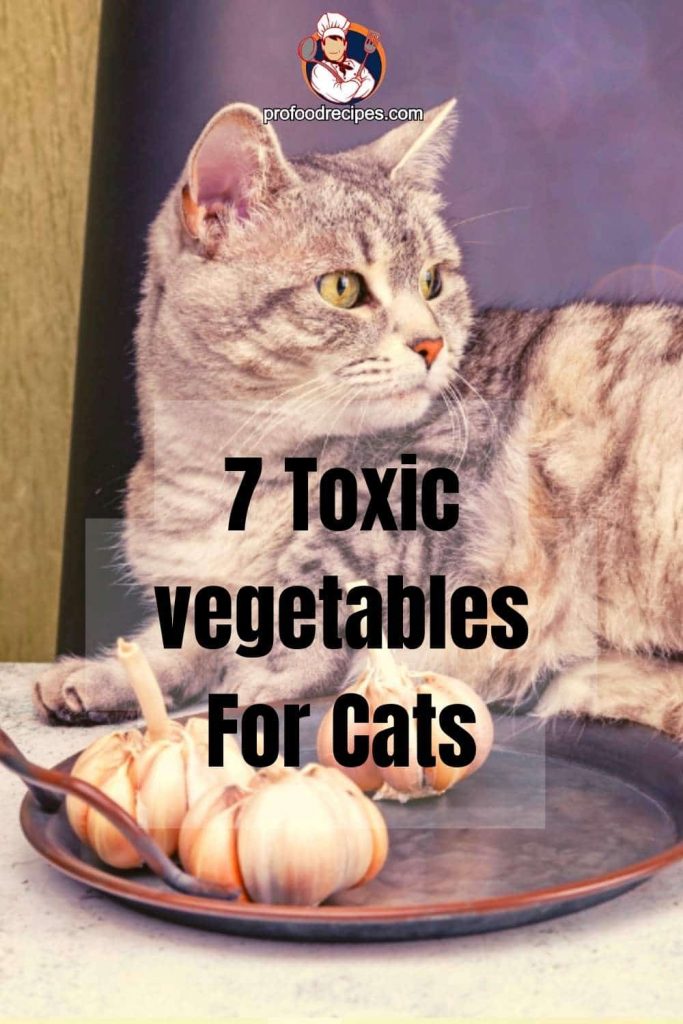Last Updated on June 25, 2022 by Amanda P. Brown
Cats are naturally fussy eaters, so you’ll want to supplement their diet with the best cat foods as a cat owner. Veggies can significantly contribute to your kitty’s nutritional profile when served as a side dish. But you shouldn’t feed your cat vegetables daily; you can give them as a special treat instead.
Veggies can be a good source of vitamins and minerals, but not all vegetables are safe for cats. Learn What Vegetables Are Bad for Cats. Check details about it in this article.
7 Toxic Vegetables for Cats
Table of Contents
- Onion
- Tomatoes
- Garlic
- Leeks
- Chives
- Mushrooms
- Rhubarb
What Vegetables Are Bad for Cats?

You can feed your cat a wide variety of raw vegetables, but a few must avoid them due to their harmful effect on cats. A list of the most toxic vegetables for cats is provided below.
1. Onion
Onions are harmful to your cats. Onions contain disulfides and thiosulfates, toxic to dogs and cats if ingested. Also, toxins found in onions can irritate some animals, particularly cats.
Onion bulbs, flowers, and stems can cause your cat to become agitated, even if they are small amounts.
The Toxic Effects of Onions on Cats:
- High heart rate
- Diarrhea
- Excessive drooling
- Physical collapse
- Weakness
- Vomiting
- Pain in the abdomen
- Elevated respiratory rate
- Lethargy
- Pale colored gums
2. Tomatoes
According to the American Society for the Prevention of Cruelty to Animals (ASPCA), tomatoes contain a substance called solanine that is toxic to various animals, including dogs, cats, and horses. If animals swallow this plant’s stems and leaves, they suffer gastrointestinal difficulties, a slowing heart rate, and other health issues.
The Toxic Effects of Tomatoes on Cats:
- Diarrhea
- Drowsiness
- Confusion
- Apathy
- Lack of appetite
- Central nervous system depression
- Excessive salivation
3. Garlic
Consuming garlic in large amounts over a long period could be hazardous to your cat’s health. Garlic contains thiosulphates and disulfides, which enter your cat’s bloodstream and cause red blood cells to rupture, leading to hemolytic anemia, a life-threatening illness.
The Toxic Effects of Garlic on Cats:
- Pale gums
- Fatigue
- Vomiting
- Increased respiratory rate
- Collapse
- Breathing problem
- Increased heart rate
4. Leeks
Leeks are dangerous to cats because they contain N-propyl disulfide, a chemical that can cause illness. It will cause damage to your cat’s hemoglobin by oxidizing or burning it.
If you continue to feed your cat leeks, the severity of its disease will increase because her blood cells will be unable to transmit oxygen from the lungs to the rest of her body.
The Toxic Effects of Leeks on Cats:
- Abdominal pain
- Diarrhea
- Excessive drooling
- Depression
- Lethargy
- Nausea
- Lack of appetite
- Vomiting
- Oral irritation
- Brown or reddish urine
- Jaundice
- Loss of muscle coordination
5. Chives
Chives, like onions and garlic, have a poisonous chemical called thiosulphate that can harm your cat’s blood cells. Smaller cats are more sensitive to this chemical, but any cat that consumes enough of it will be impacted.
It doesn’t take a high amount to cause symptoms either. Small doses taken over time can potentially have adverse effects.
The Toxic Effects of Chives on Cats:
- Vomiting
- Excessive drooling
- Abdominal pain
- Nausea
- Diarrhea
- Irritation in the mouth
- Blood in urine
- Lethargy
- Anemia
6. Mushrooms
After eating mushrooms, a pet could feel ill as quickly as fifteen minutes later, although the symptoms could last for as long as six hours. Mushrooms, especially wild mushrooms, can cause gastrointestinal pain in various ways.
If cats consume mushrooms consistently, there is a risk that they will become dehydrated and unable to maintain their strength.
Isoxazole toxins, which are present in mushrooms, make them poisonous. Nausea and vomiting are the first neurologic symptoms triggered by this toxin.
The Toxic Effects of Mushrooms on Cats:
- Severe drooling
- Yellowing of the eyes and skin
- Extreme sensitivity to light and sound
- Disorientation
- Increased grooming
- Hallucinations
- Lethargy dilated pupils
- Tremors
- Aggression
7. Rhubarb
It’s not a good idea to feed Rhubarb to your cat, as cats are obligate carnivores and lack the digestive system necessary to break down plant matter. Rhubarb is also toxic to cats due to its high soluble oxalate content.
Crystals of soluble oxalate have the potential to harm the kidneys, lead to a condition affecting the kidneys known as nephrosis, and even induce total respiratory failure.
The Toxic Effects of Rhubarb on Cats:
- Increased salivation
- Vomiting
- Irritation of the mouth
- Pawing at mouth
- Increased drooling
- Tremors
Read More: What Vegetables Are Good for Rottweilers?
Can Cats Eat Some Vegetables?
It’s pretty uncommon for cats to refuse to eat any vegetables at all. However, if your cat is a fan of the occasional veggie treat, it will get plenty of vitamins, fiber, and water. The healthiest vegetables for cats include pumpkin, broccoli, asparagus, cucumber, peas, and carrots.
Why Vegetables Are Bad for Cats?
Vegetable fiber is difficult for cats to digest because of their obligate carnivorous nature. But you risk giving your cat intestinal issues if you give her too many vegetables to feed.
Read More: Healthy Vegetables for German Shepherd
Can Cats Digest Vegetables?
Cats can benefit from vegetables, but they aren’t vital; therefore, just a small amount should give to them. Cats are not omnivores or herbivores, so it’s crucial to understand that they don’t digest vegetables similarly. Rather than breaking down vegetable materials, their digestive enzymes specialize in breaking down the meat.
Final Verdict
A cat’s nutritional needs are quite different from those of other animals. Due to the high toxicity levels in many vegetables, it is not recommended that you give them to your pet even though they are suitable for human health.
You may have decided to offer your cat a vegetable-based diet. If you’ve ever wondered What Vegetables Are Bad for Cats, you may now have an answer. One the above is a list of the most harmful vegetables you should not feed your cats.
To know about What Vegetables Are Best for Cats? Stay with Pro Food Recipes.
You May Also Like to Read:
- Best Homemade Food for Persian Kitten
- 7 Best Vet Approved Homemade Cat Food Recipes
- Dry Vs Wet Cat Food Pros and Cons
